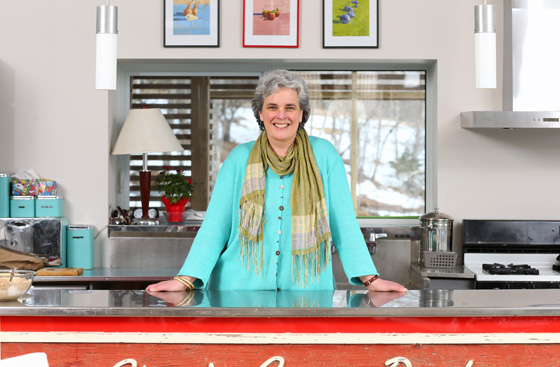
Jennifer Corson (BEDS’90, MARFP (TUNS)’91): Efficient Venturer
By Mark Campbell
Jennifer Corson (BEDS’90, MARFP (TUNS)’91) is frustrated that we send most of the glass collected through Nova Scotia’s blue bag program out of province.
“We just completed The Concept House in Lunenburg, NS where we used 89 tons of recycled glass,” says Corson, a partner in Solterre Design, an architectural firm specializing in green designs and LEED certifications. “If every tenth project in the province used this glass, we might be able to recycle it all in-house instead of sending it down the road for someone else to deal with.”
She pauses and sighs. “I need another business like I need a hole in the head.”
Corson may not need another business, but issues such as this demand a champion like her. For more than two decades, she has dedicated her energy and talents to changing the way that people think about architecture and design. That commitment has earned her awards and accolades from the Canadian Agreement for Sustainable Economic Development, Environment Canada, the National Research Council of Canada and CMHC.
Yet to hear Corson tell it, it was never her intent to change the world. “My interest is design and architecture, with an artistic nature to go at it economically and efficiently. That’s what I do.”
Building in her blood
Whatever Corson’s intent, she has made a difference, not just in advancing energy-efficient home and office designs, but also in diverting materials from the waste stream. “I have Scottish and Italian heritage,” she explains. “You put those together and you get a thrifty romantic, or someone interested in getting something economically that’s also beautiful.”
You also get someone with building in her blood. Her great grandfather was a stone mason, as were his brothers, and Corson liked to tinker in her father’s workshop. Yet this Revelstoke, BC native found herself gravitating to architecture when she was barely a teen, and that led her across the country to Dalhousie’s Master’s of Architecture program when she was 18.
Initially, Corson envisioned designing airports with a major Vancouver firm, yet a student work term there grinding out production buildings as the city tore down its heritage left her disillusioned. She credits Dalhousie for restoring her passion.
“I was designing, building and collaborating with students who had returned from work terms in Bogota, Columbia. They were really inspired, so I applied to join a project that had been initiated between Dalhousie and the University of Guinea in Conakry. Dalhousie offered me an opportunity to do an about-face that was elemental to my focus on resourcefulness.”
Discovering there was no project activity or research underway when she arrived, Corson studied the manufacture of air-dried earth brick, while doing a survey on the quality of concrete block making.
That experience, and Dalhousie University, filled her with a new sense of purpose and made her a green-minded creative problem solver. In 1992, she started Solterre with her husband, Keith Robertson (BEDS’91, MARFP (TUNS)’92). Considered ‘out there’ for focusing on solar energy and green design, rising energy costs have changed that perception. Today, clients such as contractors, architects, developers and building owners turn to Robertson’s team for LEED expertise and Corson’s team for energy-efficient commercial and residential buildings.
A full plate
In 1994, Corson launched a second green venture – an architectural salvage company called Renovators Resource. It was a creative solution to two problems: a client who wanted to build a Nantucket-style farmhouse and builders who were grappling with increased waste system tipping fees. Though uncertain as to how many tons of materials the company has diverted from the waste stream almost twenty years later, Corson is sure it has made an impact.
“We’re known as the company that saves buildings. At one point, we had a full crew dismantling old churches that were to be torn down. We sold them on the internet around North America. You could just be a church dismantler in Nova Scotia if the US economy were stronger.”
That’s not all Corson has on her plate. She’s involved with the Keystone Awards at Dalhousie, she recently earned her architecture registration, and she’s looking at a collaborative green architecture project with the University of Guinea in Conakry. She’s also a proud mother of two kids who seem to have inherited her resourcefulness and desire to make a difference.
“They are two adventurous, somewhat capitalistic kids who are concerned with creative problem solving. So I am pretty confident they will carry the flag, maybe not in architecture, but in problem solving.”
If so, here’s hoping they figure out what to do with Nova Scotia’s glass.